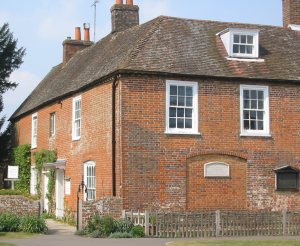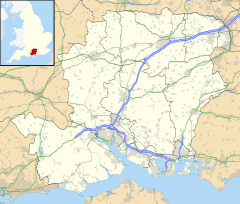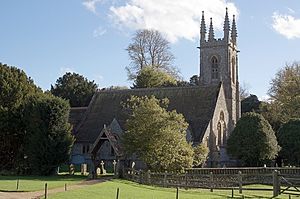Chawton facts for kids
Quick facts for kids Chawton |
|
|---|---|
 Jane Austen's House |
|
| Population | 445 (2011 Census) |
| OS grid reference | SU710373 |
| Civil parish |
|
| District |
|
| Shire county | |
| Region | |
| Country | England |
| Sovereign state | United Kingdom |
| Post town | ALTON |
| Postcode district | GU34 |
| Dialling code | 01420 |
| Police | Hampshire |
| Fire | Hampshire |
| Ambulance | South Central |
| EU Parliament | South East England |
| UK Parliament |
|
Chawton is a small village in Hampshire, England. It is located in the East Hampshire area. The village is part of the beautiful South Downs National Park. Chawton is famous because the well-known writer Jane Austen lived here for the last eight years of her life.
Contents
History of Chawton
Chawton's story officially begins in 1086. This is when it was written about in the Domesday survey. Back then, the village had 19 free people, 8 small farmers, and 6 slaves. There was also a large woodland with many pigs.
In the 1200s, Chawton had a royal manor house. King Henry III visited this house more than 40 times! Later, a man named John Knight built the current Chawton House. This was around the time of the Spanish Armada in 1588. His family changed the house and its gardens over many years.
One of John Knight's family members was Elizabeth Knight. Her two husbands even took her last name! Later, in the 1700s, Jane Austen's brother, Edward Austen Knight, took over the estate. In 1809, he helped his mother and sisters move into a small cottage in the village. This is where Jane Austen lived and wrote some of her famous novels.
Chawton never grew into a very big town. This might be because the lords (owners) of the manor wanted to keep the land mostly for themselves. In the 1700s, a big change happened with the land. This was called "enclosure." It meant that common lands, which everyone could use, were divided up and given to private owners. This mostly benefited the landowners, like Thomas Knight, who gained a lot of land.
Places to Visit in Chawton
Chawton has some interesting places to explore, especially if you like history and literature.
Jane Austen's House (Chawton Cottage)
Chawton Cottage is where Jane Austen lived and wrote. You can visit her house and garden. It's like stepping back in time to see how she lived.
Chawton House
Chawton House is a very old manor house, about 400 years old. It used to belong to Jane Austen's brother. Today, it is a special place for studying old writings by women from 1600 to 1830. It has a huge collection of over 9,000 books. Visitors can see how the library, house, and farm worked together long ago.
St Nicholas' Church
Chawton has one church called St Nicholas. There has been a church on this spot since at least 1270. In 1871, a big fire destroyed most of the church. It was rebuilt by a famous architect, Sir Arthur Blomfield.
The churchyard is where many members of the Knight family are buried. This includes Jane Austen's mother and sister, both named Cassandra. The church tower has eight bells. Six of these bells were made in 2009 for traditional English bell ringing.
Life in Chawton
Chawton is a small village with a few important services for its residents and visitors.
Chawton C of E Primary School
This is the only school in Chawton. It is for children aged four to eleven. The school has strong connections with St Nicholas' Church. There has been a school on this site since about 1840. It is located across from the village green.
Village Amenities
On Winchester Road, you'll find a tea shop and a small shop called Cassandra's Cup. It's named after Jane Austen's sister and is right across from Jane Austen's house. A bit further down the road is a pub called The Greyfriar. It has a traditional feel with oak beams. The Village Hall is also on Winchester Road.
Near Gosport Road, there's a green area with a cricket pitch. This is home to the Chawton Cricket Club. There's also a newly updated playground and some garden plots (allotments) for growing food.
Getting Around
Chawton has two main road exits. One connects to the A31 and A32 roads. The other leads to the A339/B3006 Selborne Road. The closest train station is in Alton, which is about 1.7 miles (2.7 km) away.
 | Bessie Coleman |
 | Spann Watson |
 | Jill E. Brown |
 | Sherman W. White |



